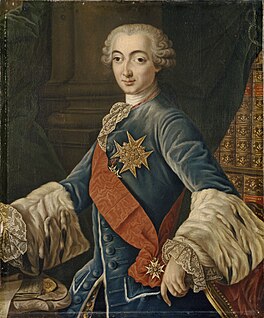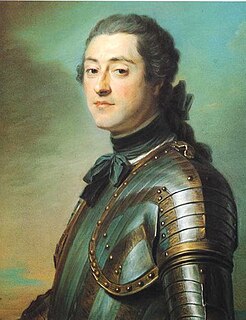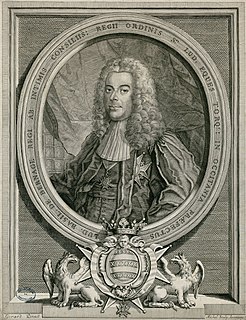Under the Old Regime
Councillors of State were among the highest dignitaries of the French monarchy during the Ancien Régime. Being thirty in total, the Councillors of State included three clergymen, three from the old nobility (nobility "of the sword" or d'épée), and twenty-four from the noblesse de robe , or "administrative nobility". Ninety percent of the Councillors of State de robe were promoted from among the Masters of Requests, while the rest were chosen from among judges of the prerogative courts; often they had prior experience working as intendants. In 1789, their number was increased to 42: 25 full-time Councillors ordinary, 16 part-time consellors who functioned on a semester schedule, and the eldest of the Masters of Requests.

The Ancien Régime was the political and social system of the Kingdom of France from the Late Middle Ages until 1789, when hereditary monarchy and the feudal system of French nobility were abolished by the French Revolution. The Ancien Régime was ruled by the late Valois and Bourbon dynasties. The term is occasionally used to refer to the similar feudal systems of the time elsewhere in Europe. The administrative and social structures of the Ancien Régime were the result of years of state-building, legislative acts, internal conflicts, and civil wars, but they remained and the Valois Dynasty's attempts at re-establishing control over the scattered political centres of the country were hindered by the Huguenot Wars. Much of the reigns of Henry IV and Louis XIII and the early years of Louis XIV were focused on administrative centralization. Despite, however, the notion of "absolute monarchy" and the efforts by the kings to create a centralized state, the Kingdom of France retained its irregularities: authority regularly overlapped and nobles struggled to retain autonomy.
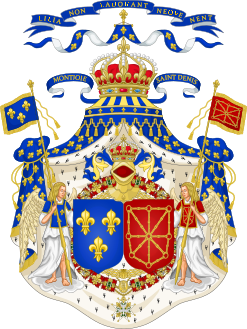
The French nobility was a privileged social class in France during the Middle Ages and the Early Modern period to the revolution in 1790. The nobility was revived in 1805 with limited rights as a titled elite class from the First Empire to the fall of the July Monarchy in 1848, when all privileges were abolished for good. Hereditary titles, without privileges, continued to be granted until the Second Empire fell in 1870. They survive among their descendants as a social convention and as part of the legal name of the corresponding individuals.
A Master of Requests is a Counsel of the Council of State, a high-level judicial officer of administrative law in France and other European countries that has existed in one form or another since the Middle Ages.
Their title gave them great power, and in the administrative hierarchy they were considered directly below Princes of the royal family ("princes du sang"), cardinals, and Dukes or Peers ("Ducs et pairs"). The pay was minimal, i.e., 3,300 to 5,100 French pounds per year, depending on the duration of service, but could be augmented by an additional 4,000 pounds per year through pensions or by service on financial commissions.

The Peerage of France was a hereditary distinction within the French nobility which appeared in 1180 in the Middle Ages, and only a small number of noble individuals were peers. It was abolished in 1789 during the French Revolution, but it reappeared in 1814 at the time of the Bourbon Restoration which followed the fall of the First French Empire, when the Chamber of Peers was given a constitutional function somewhat along British lines, which lasted until the Revolution of 1848. On 10 October 1831, by a vote of 324 against 26 of the Chamber of Deputies, hereditary peerages were abolished, but peerages for the life of the holder continued to exist until the chamber and rank were definitively abolished in 1848.
The livre tournois, French for the "Tours pound", was:
Councillors held commissions (i.e. not purchased and hereditary offices) appointed by the king by letters patent. The prestigious position conferred immediate nobility on the commission-holder, if not already a member of the nobility. Their official job description stated that they were to be "consulted by the King on any matter and on any occasion as the King saw fit". In practice, their role was a combination of the duties of present-day Councillors of State and justices of the French Supreme Court.
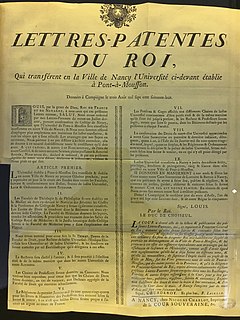
Letters patent are a type of legal instrument in the form of a published written order issued by a monarch, president, or other head of state, generally granting an office, right, monopoly, title, or status to a person or corporation. Letters patent can be used for the creation of corporations or government offices, or for the granting of city status or a coat of arms. Letters patent are issued for the appointment of representatives of the Crown, such as governors and governors-general of Commonwealth realms, as well as appointing a Royal Commission. In the United Kingdom they are also issued for the creation of peers of the realm. A particular form of letters patent has evolved into the modern patent granting exclusive rights in an invention. In this case it is essential that the written grant should be in the form of a public document so other inventors can consult it to avoid infringement and also to understand how to "practice" the invention, i.e., put it into practical use. In the Holy Roman Empire, Austrian Empire and Austria-Hungary, imperial patent was also the highest form of generally binding legal regulations, e. g. Patent of Toleration, Serfdom Patent etc.

The Court of Cassation is one of the four courts of last resort in France. It has jurisdiction over all civil and criminal matters triable in the judicial system, and is the supreme court of appeal in these cases. It has jurisdiction to review the law, and to certify questions of law, to determine miscarriages of justice. The Court is located in the Palace of Justice in Paris.
Commissions were not limited by age, although the King generally appointed men of lawful age. René-Louis de Voyer de Paulmy d'Argenson became Councillor of State at the age of 24 and Marc-Pierre de Voyer de Paulmy d'Argenson at 22. Councillors often combined their function with other administrative positions such as ambassador, President of the High Court, and so forth
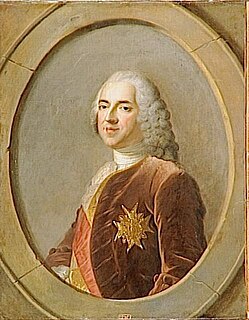
Marc-Pierre de Voyer de Paulmy, Comte d'Argenson was a French politician
All the Councillors of State sat on the King's Council of State ("Conseil privé", "Conseil des parties" or "Conseil d'État"). As part of the judicial system and officially established in 1557, this was the largest of the King's Councils, composed of the Lord Chancellor, Dukes and Peers, the Ministers and Secretaries of State, the Controller-General, the 30 Councillors of State, the 80 Masters of Requests, and the Intendants of finance. The State councillors could also be called before other of the King's Councils on affairs under their charge.
After the Revolution
Councillors of State became high-level government officials serving in the Council of State. A Councillor of State is one of the six ranks of the Council's members, namely, Master, Senior Master, Master of Requests, Councillor of State, Department Head, and Vice-Chairman.
This page is based on this
Wikipedia article Text is available under the
CC BY-SA 4.0 license; additional terms may apply.
Images, videos and audio are available under their respective licenses.









